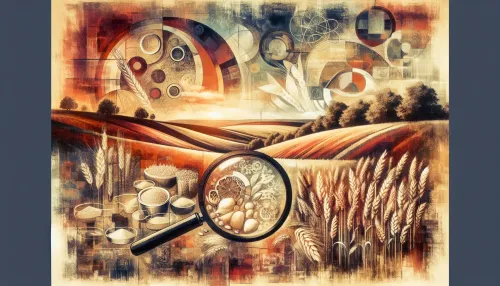Vegan vs. Paleo Diets: Unraveling Nutritional Philosophies for Optimal Health

The world of dieting is diverse, and two prominent philosophies that have garnered significant attention in recent years are the Vegan and Paleo diets. Both diets have passionate followers who advocate for their respective nutritional benefits. In this article, we will delve into the historical background, nutrient comparison, impact on chronic diseases, sustainability, adaptability for daily life, community insights, professional viewpoints, and the cultural and ethical dimensions that shape dietary decisions in the realms of Veganism and Paleo.
Understanding the Historical Background of Vegan and Paleo Diets
The Vegan diet traces its origins back to the early 20th century when it was first conceptualized as a part of a vegetarian movement that sought to exclude all forms of animal exploitation. The modern Vegan diet emphasizes plant-based foods while eliminating any animal-derived products such as meat, dairy, and eggs. On the other hand, the Paleo diet, also known as the "Caveman diet," draws inspiration from our hunter-gatherer ancestors. It focuses on consuming whole foods such as lean meats, fish, fruits, vegetables, nuts, and seeds while excluding processed foods, grains, and dairy products.
A critical aspect of both diets is understanding the nutrient composition they offer. The Vegan diet typically provides high levels of fiber, antioxidants, and essential vitamins found in fruits, vegetables, and legumes. Conversely, the Paleo diet prioritizes protein intake through animal sources while restricting grains and legumes. This fundamental difference in nutrient distribution sets these diets apart and underscores the importance of choosing a diet that aligns with individual nutritional needs.
Nutrient Comparison: Vegan vs. Paleo Diets
The nutritional choices we make greatly influence our susceptibility to chronic diseases. Studies have shown that a well-planned Vegan diet can contribute to lower cholesterol levels and reduced risks of heart disease and type 2 diabetes due to its low saturated fat content. On the other hand, proponents of the Paleo diet argue that its emphasis on unprocessed foods can lead to weight loss and improved blood sugar control. However, experts emphasize that individual variations in response to these dietary patterns must be considered when evaluating their impact on chronic diseases.
In an era where environmental sustainability is a growing concern, the environmental impact of dietary choices cannot be overlooked. The Vegan diet has been lauded for its low carbon footprint as it eliminates the need for livestock farming, reducing greenhouse gas emissions and land use. Conversely, while the Paleo diet encourages whole food consumption, it often relies on animal products that can have a more significant environmental impact. This aspect highlights the complex interplay between personal health choices and their broader ecological implications.
Related Article: Forgotten Figures in Nutritional Wellness: Reviving Legacies of Nutrient Pioneers for Modern Diets
Impact on Chronic Diseases: Heart Health, Diabetes, and Obesity
Amidst busy lifestyles, the practicality of adhering to a specific diet plays a pivotal role in its sustainability. The Vegan diet often requires careful meal planning to ensure adequate macronutrient intake due to its exclusion of animal products. Contrastingly, some proponents of the Paleo diet find it manageable as it aligns closely with unprocessed whole foods but may face challenges with modern food availability. Evaluating these factors allows individuals to make informed decisions based on their lifestyle constraints.
Sustainability Spotlight: Environmental Impact of Diets
Drawing from real-life experiences can provide valuable insights into the practical aspects of following specific diets. The Vegan community often shares success stories related to weight loss, improved energy levels, and ethical fulfillment from abstaining from animal products. On the other hand, adherents of the Paleo diet frequently highlight its positive effects on digestive health and overall well-being. Acknowledging these personal narratives offers a holistic perspective on how these diets resonate with individuals.
Related Article: Snack Smart: Wholesome Bites for Energy and Vitality
Adaptability for Daily Life: Meal Preparation and Convenience
Nutritionists play a crucial role in providing evidence-based perspectives on dietary choices. While acknowledging potential benefits inherent in both diets, nutritionists often stress the importance of long-term balance and nutritional adequacy. It's imperative to consider factors such as individual health status, possible deficiencies associated with restrictive diets, and sustainable dietary practices guided by professional advice.
Dietary choices are not solely about nutrition; they are also influenced by cultural traditions and ethical beliefs. For many individuals following a Vegan lifestyle, their choice stems from ethical considerations regarding animal welfare and environmental conservation. Alternatively, those embracing the Paleo philosophy often cite a desire to reconnect with natural eating patterns that align with evolutionary principles.
Community Insights: Success Stories from Vegan and Paleo Followers
In conclusion, both Veganism and Paleo offer distinct approaches to nutrition that cater to diverse philosophies and priorities held by individuals seeking optimal health. Each diet brings its unique set of advantages while prompting ongoing discussions regarding their long-term sustainability and overall impact on well-being.
Frequently Asked Questions
The Vegan diet originated in the early 20th century as part of a vegetarian movement focused on excluding all animal exploitation. In contrast, the Paleo diet, inspired by hunter-gatherer ancestors, emphasizes whole foods like lean meats and vegetables while avoiding processed foods and grains.
A well-planned Vegan diet can lower cholesterol levels and reduce risks of heart disease and type 2 diabetes due to its low saturated fat content. Conversely, the Paleo diet's focus on unprocessed foods may aid weight loss and improve blood sugar control, but individual responses vary.
Cultural traditions and ethical beliefs significantly shape dietary decisions. Many individuals choose a Vegan lifestyle for ethical reasons related to animal welfare and environmental conservation. Meanwhile, those following the Paleo diet often seek to reconnect with natural eating patterns aligned with evolutionary principles.
Both Vegan and Paleo diets can offer nutritional benefits, but they require careful planning to ensure adequacy. Nutritionists emphasize the importance of balance and addressing potential deficiencies associated with restrictive diets, making professional guidance essential for long-term health.
The practicality of adhering to a specific diet is crucial for sustainability. The Vegan diet often requires meticulous meal planning to meet nutritional needs due to its exclusion of animal products. In contrast, some find the Paleo diet manageable, although it may face challenges with food availability.
Check Out These Related Articles

Mindful Nutrition: The Art of Eating Well for Holistic Health

Balanced Eating Unveiled: What I Wish I Knew About Nutrition Fundamentals

The Pitfalls of Popular Diets: Navigating Myths and Facts for Wellness Novices
